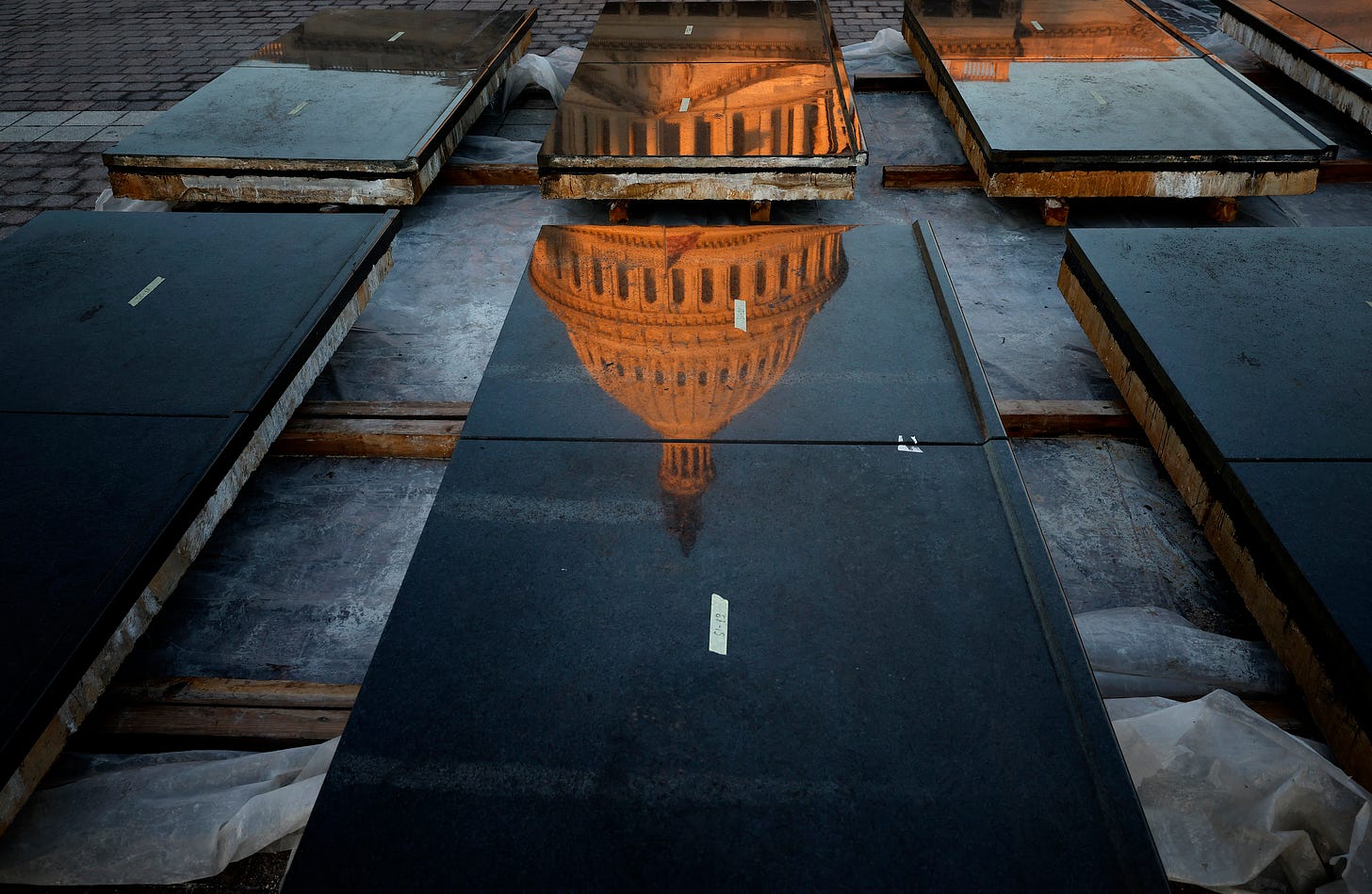
Discover more from The Bulwark
Americans Want More Bipartisanship in Congress
... even as the Republican party continues to drift rightward.

HERE WE GO AGAIN: Funding for the federal government runs out at the end of this week. A government shutdown will begin at 12:01 a.m. on Saturday, with hundreds of thousands of federal employees sent home without pay and many important government services paused.
Unless, that is, a new budget deal can be reached. The last deal, enacted on September 30, was the excuse used by Matt Gaetz and his fellow Republican rebels for ousting Speaker Kevin McCarthy, leading to three weeks of paralysis as Republicans tried to pick a successor. Now, if a shutdown is to be averted, it’s up to new Speaker Mike Johnson to reach a budget agreement with the president, the Senate, and perhaps most difficult of all, his fellow House Republicans.
It is a significant first test for the inexperienced new speaker, about whose record the country is still learning. Now in only his fourth term in Congress, Johnson holds views on nearly every policy issue, from abortion to government spending, that are to the right of the average House Republican, not to mention the vast majority of Americans. Especially disturbing is the key role he played in the efforts to overturn the will of American voters in the 2020 election, first by recruiting his fellow House Republicans to sign a Supreme Court brief in favor of invalidating the results in several battleground states Biden won, then in engineering the effort to object to the congressional certification of the election on January 6, 2021.
There’s no guarantee that Johnson won’t face his own speakership challenge if he reaches a budget deal that leaves the far right of the House Republican conference unhappy—and then we may see a return to the chaos, infighting, and petty showdowns that ruled the House in October.
While the dysfunction we’ve seen in the House all this year is a direct result of the Republicans’ narrow majority, it’s also the result of a troubling culture that has been building in Congress for years. Our politics are splintering around multiple deeply ideological factions, making consensus difficult, even within a single political party, and yielding outcomes that are far out of step with the vast majority of Americans.
And this comes at a moment when Americans are desperately seeking bipartisan governance. As the speakership fight was reaching its climax last month, a poll conducted by SurveyUSA found that, by a two to one margin, likely voters living in “battleground” congressional districts wanted House Republicans to work with Democrats to form a bipartisan governing coalition, instead of selecting a House Speaker on their own. Even a third of Republicans said that they would have preferred a coalition in the House instead of speaker picked by Republicans alone. And more than half of the respondents said they would be more likely to vote for their U.S. representative if he or she participated in a bipartisan governing coalition.
That ship has sailed, alas—unless Johnson is ousted and a search for yet another House speaker begins. But other findings from the survey, which was commissioned by the Institute for Responsive Governing Action, Country First, and WelcomePAC, remain relevant, and indicate a strong desire for bipartisanship. In particular, there is overwhelming support—by more than three to one—for allowing bills to receive a vote on the House floor only if they have bipartisan support.
It’s worth noting that the poll didn’t ask about other avenues of possible bipartisanship, such as the controversial No Labels project to put together a bipartisan presidential ticket. Still, when it comes to governance, especially in Congress, the evidence is clear: Across party lines and zip codes, Americans want both parties to work together to get things done and move our country forward.
WE’LL SEE HOW LONG Mike Johnson’s speakership lasts. Few House Republicans have the appetite for another prolonged leadership fight, but they might not have a choice if it is thrust upon them.
If a new leadership crisis does arise, it is worth remembering that, while a bipartisan coalition to select a speaker of the House has never before happened at the federal level, there are precedents at the state level. Currently, two conservative states have successful power-sharing agreements in place. In Alaska and Ohio, states Donald Trump won in both 2016 and 2020, Republicans and Democrats structured agreements to elect consensus leaders of their respective legislative bodies to better represent their constituents. And for a decade, from 2009 to 2019, Joe Straus was a successful consensus speaker of the Texas House of Representatives. These laboratories of democracy have shown that such a thing is possible; Congress can take these same steps to lower the partisan temperature and do a better job of working for the American people.
Only a failure of imagination is stopping Congress from coming together across the aisle to advance common-sense policy solutions that will improve life for everyday Americans. As the government edges toward yet another shutdown this week, and as the world watches what will appear to be yet another example of dysfunction in Washington, isn’t it time to stand up and deliver the kind of bipartisan leadership the American people desire—and deserve?
Riley Berg is the president of Country First Action. Sam Oliker-Friedland is the president of Institute for Responsive Government Action.



















